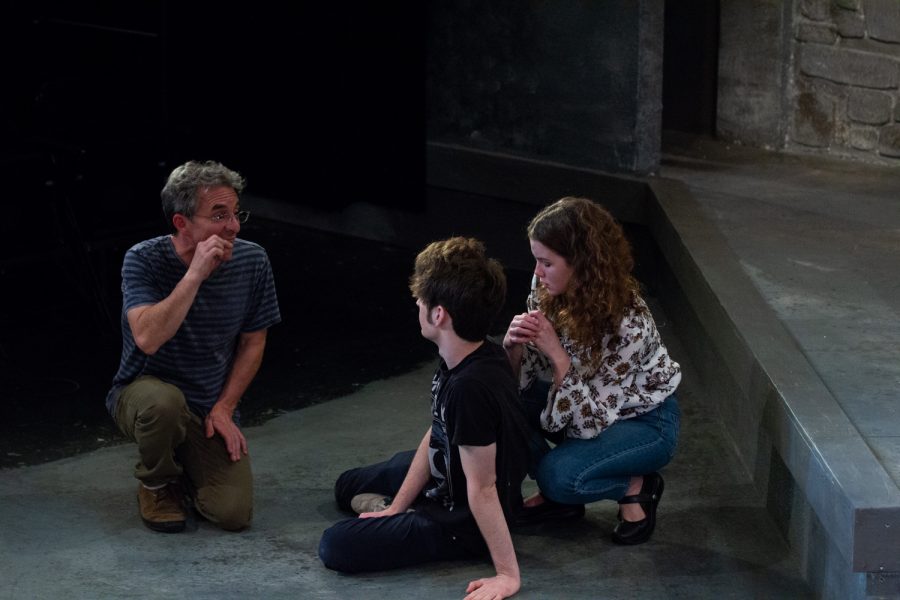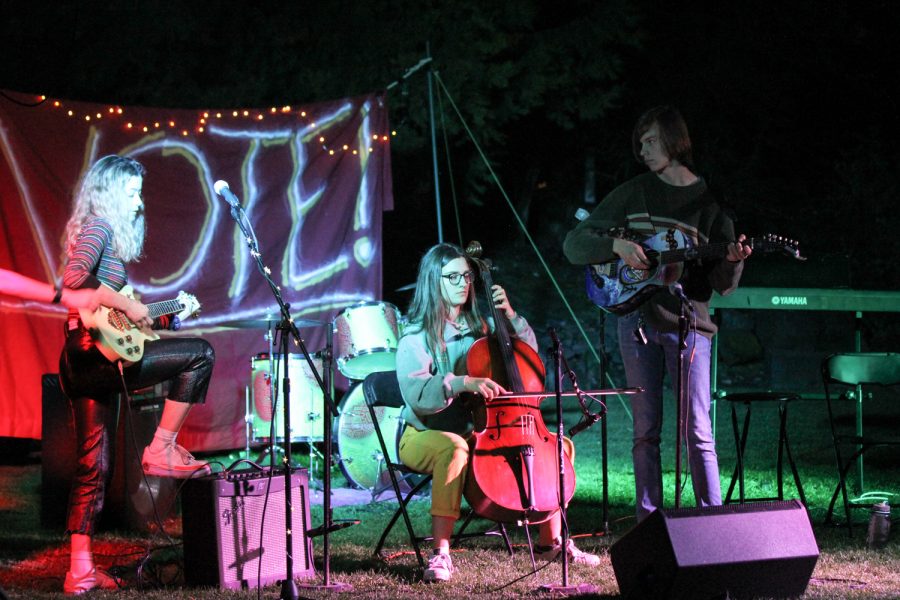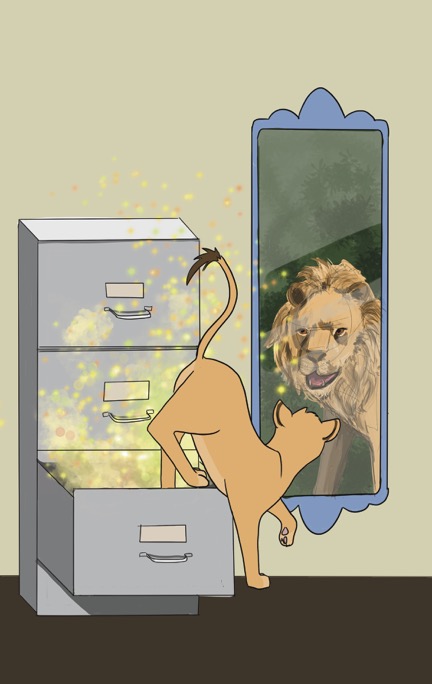You may have heard of Magic: The Gathering, a widespread card game with roots at our very own alma mater. While its influence has spread far and wide, the gaming community remains strong at Whitman, in Walla Walla and in surrounding areas. In fact, the Magic community is one that pierces the notorious Whitman bubble and brings players of varying ages and origins together.

Game Day
On Saturday, Oct. 27, in an open space in between the women’s shoes and juniors departments of Macy’s in downtown Walla Walla, a group of disparate Magic players began to gather for Game Day Return to Ravnica, an afternoon of challenges and games to determine which players would come out on top. Some were Whitman students, others from Milton-Freewater and Walla Walla and a few were students from Walla Walla High School. But they were all there for the same reason: perhaps to win, but mostly to enjoy themselves and the camaraderie of their community.
Before the official tournament began, players loitered around the tables, discussing what strategies they planned to employ, asking each other’s advice and postulating possible card exchanges. The talk was casual; there wasn’t much tension hinting at the competition that was to soon begin, but an air of anticipation and excitement.
Once the games did begin, though, it was all business. While there was the occasional snarky comment or joke, for the most part the dialogue between competitors was bare-bones and efficient:
“Go.”
“Pass turn.”
“Let’s see what you got.”
The players efficiently and quickly went through the motions of the game with an ease that only comes from hours of practice; they wasted no time seeing whose deck would come out on top.
Despite the higher stakes of this particular tournament (players received twice as many PW points as they normally would; suffice it to say, these points are important for future tournaments), the atmosphere was casual: The guys were there to have a good time doing something they enjoyed, not to beat each other out and come out on top––as much as I’m sure all of them would’ve liked to win all the bragging rights.
The Appeal Behind Magic
The beauty behind Magic, and perhaps the reason behind its massive popularity, lies in its complexity and malleability.
The player fills the role of a “planeswalker,” so called because as a powerful mage or wizard, he or she can “walk” between different planes of the Magic multiverse, allowing him or her to collect spells and creatures along the way, which are represented by the cards used to play the game. “Mana” is the magical energy that powers spells and is represented by five colors, and was probably the inspiration for the “energy” cards in the similar Pokémon card game. Each color of mana has its own strengths and weaknesses, its own unique environment and its own traits.
White mana is the color of the plains and implies order, protection and light. Black is associated with swamps and represents darkness, ambition and death. Blue stands for islands and implies knowledge, manipulation and illusion. Red comes from mountains and is associated with freedom, emotion and impulse. And finally, green mana hails from forests and is driven by growth, instinct and nature. Players draw mana from special cards that represent the five lands listed above, which allow them to power their attacks and spells. Decks, which are typically composed of 60 cards, are varying combinations of these five colors that suit the player’s style of competition. Some players tend toward mostly blue and white decks; others won’t dare touch black mana. It all depends on the preference of the person holding the deck.
A common problem with card games is a phenomenon called “power creep,” essentially an arms race that is created by the game’s parent company in order to sell more cards. In order to entice costumers, companies will design cards that have, say, more HP or stronger attacks than older cards, which make older decks obsolete. But Wizards of the Coast, Magic’s parent company, has evaded this problem by releasing not stronger or tougher cards but simply different ones, cards that players can manipulate themselves to make their decks more powerful. New releases provide players with new options as far as strategy and deck development goes, and while the cards remain at the same level it’s up to the player to empower his or her deck.
The strategy-forming and customizing aspects of the game are consistently cited as the most appealing aspect of Magic. With thousands and thousands of cards that make up the body of material that players work with, there are innumerable combinations of decks that players can utilize to win in their own unique way.
“You can pretty much build any deck you want and play any way you like. The sheer possibilities are limitless. It’s like a constantly evolving puzzle that has a human element to it,” said senior Paul Chang in an email.
Magic’s Origin
It’s relatively well known that Magic: The Gathering has roots at Whitman College. The creator, Richard Garfield, was a visiting professor of mathematics at Whitman in the early ’90s. Garfield began designing the card game as a grad student at the University of Pennsylvania in the early 1980s. He earned a Ph.D in combinational mathematics with a dissertation entitled “On the Residue Classes of Combinatorial Families of Numbers” and came to Whitman after he graduated in 1993. Rumor has it that he was not that great of a professor, but perhaps that’s because his heart lay in game design.
While he spent years perfecting the design of Magic and testing it on his peers and students, it came to fruition while he was at Whitman. The card game was launched in 1993. Garfield left his academic career to join Wizards of the Coast in 1994 and began a new career as a game designer. It could be said that Garfield singlehandedly invented the concept of a trading card game with the introduction of Magic. His game was out before Pokémon, before Yu-Gi-Oh! and established a standard of innovation that has yet to be matched.
Garfield even proposed to his wife, Lily, in the midst of a game––he commissioned a special card entitled “Proposal,” which read “Allows Richard to propose to Lily.” The card, however, came at a high mana price, so Garfield had a great deal of difficulty playing the card. Any other man may have simply fudged the rules in order to get straight to the actual proposal, but Garfield spent four games trying to play the card legally. He eventually did and scored a wife in the process.
Magic at Whitman
Besides the fact that Whitman is the location of Magic’s origin, it’s not surprising that insightful Whitman students are very interested in a card game that challenges their minds.
Players often cite Magic’s intellectual challenges as one of its best qualities.
“I have always liked playing board and card games, and Magic seemed like the ultimate strategic challenge,” said Chang.
Senior Kevin Dyer also enjoys the challenge.
“I sometimes go to a tourney with the purpose of doing the best I can. I’ve also had times when I’ve gone out of my way to play bad decks, just for the fun/challenge of playing something off the beaten path,” he said in an email interview.
Sophomore Ethan Scardina discussed the three colloquial Magic archetypes that are well known within the Magic community: Timmies, Johnnies and Spikes.
“Timmies don’t think about cool mechanics. They pick their favorite cards and play them. ‘I’m gonna throw this card into my deck because it’s cool.’ Johnnies––I’m a Johnny––like to look at cards and find cool interactions and mechanics and make cool decks out of them. Find a subtle synergy between cards and play off of that. Spikes play to win and take the game super seriously. They build the best deck they can with what’s out right now,” Scardina said.
There does seem to be a distinction between casual and serious players at Whitman, but that doesn’t mean that the two groups are exclusive. Some players consider themselves mixes of two of these player archetypes. You can be competitive but still have fun; that is, you can be a bit of a Timmy but also a bit of a Spike.
Chang said that “the Whitman Magic community consists of a few really serious competitive players (my friends and me) and a lot of very casual noncompetitive players … The community as a whole is very friendly and welcoming of everyone who wishes to attend and be a part of the community.”
Dyer, who admitted he can get competitive, said: “I play Magic for a lot of reasons, number one being fun, as well as the friends that I’ve made through the game. Some of the best friends I’ve met and made at Whitman have been through this game.”
“Two friends and I drove to Portland for a midnight tournament which finished about six in the morning. [We] went and slept for a few hours, and then went and played in another tournament later that day, which lasted until about nine at night,” he continued. “It was a ridiculous experience, but absolutely worth it.”
Players may be competitive at Whitman or they may not be, but in the end what matters to them is the camaraderie and the friendship that results from being a part of such a close-knit community.
Whether players consider themselves Spikes or Timmies or Johnnies or a combination of all three, there seems to be a uniting factor on all fronts: They all play to enjoy themselves, to engage in a cohesive community and to engross themselves in what Chang called “a constantly evolving puzzle,” a game of endless possibilities and strategic redefinitions.
What Magic comes down to, as its name implies, really is a gathering––perhaps not of mystical creatures and multiverses and countless enchantments, but of people who just like to get together, have a good time and talk about something they love to do with people who love it as much as they do.
























Matthew Evans • Jan 13, 2022 at 10:02 am
Interesting and well written! I remember going to Western Paladin Games near campus. Good times, and a great way to spend a summer if you’re stuck in Walla Walla doing research!